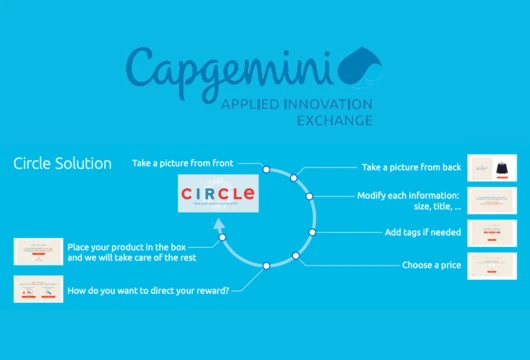Capgemini, a global leader in consulting and technology services, has unveiled a groundbreaking solution that promises to reshape the fashion industry— ‘Circle.’ Designed to promote sustainability and circularity in retail, Circle is an AI-powered platform to optimize second-hand apparel collection, resale, and management. With this innovation, Capgemini sets new standards for how fashion brands can integrate circularity into their business models.
This new initiative aligns with global efforts to transition towards sustainable fashion, addressing key challenges such as waste reduction, customer loyalty, and value recovery. Capgemini is leveraging cutting-edge technology to revolutionize the second-hand clothing market and advance the CircularID™ Standard by partnering with Intel, HP, and Eon’s digital identity platform.
Capgemini Pioneers Circularity with AI-Powered ‘Circle’ Solution for Fashion
At the heart of Capgemini’s Circle is circularity, which refers to the sustainable management of products throughout their lifecycle. In the fashion industry, this translates to extending the lifespan of clothing by promoting the resale and reuse of items, thus reducing the environmental impact of producing new garments.
Capgemini’s Circle solution uses artificial intelligence (AI) and computer vision to identify second-hand clothing items’ brands, conditions, and values. By automating these processes, Circle enables fashion retailers to collect and resell used apparel more efficiently, fostering a circular economy within the industry. This cuts down on textile waste and helps brands capture additional value from products that would otherwise end up in landfills.
Circularity in Action: How Capgemini’s ‘Circle’ is Transforming Retail Sustainability
1. Increased Volume of Collected Apparel: One of Circle’s most significant advantages is its ability to scale the collection and resale of used clothing. By utilizing AI, the solution automates assessing clothing items, increasing the volume of second-hand apparel that can be processed and resold.
2. Waste Reduction: Textile waste is one of the most significant contributors to global pollution, with millions of tons of clothing discarded yearly. By facilitating the resale of used garments, Circle helps to reduce this waste, making fashion more sustainable and environmentally friendly.
3. Improved Brand Image: Consumers increasingly demand that fashion brands demonstrate their commitment to sustainability. By adopting Circle, companies can bolster their brand image, showcasing their dedication to promoting circularity and reducing their carbon footprint.
4. Customer Loyalty and Retention: Circularity benefits the environment and helps brands attract and retain customers. Today’s shoppers are more eco-conscious than ever, and offering a resale or recycling program through Circle can enhance customer loyalty, particularly among younger demographics who prioritize sustainability.
5. Capturing Additional Value: Brands can capture additional value from their products by collecting and reselling used clothing. This creates a new revenue stream and enhances overall profitability, even after the initial sale of a garment.
The Role of Technology in Driving Circularity
Capgemini’s Circle solution is powered by advanced AI and computer vision technologies, which are crucial in its efficiency and scalability. Working alongside Intel and HP, Capgemini has developed a platform capable of accurately identifying critical characteristics of second-hand apparel, such as its brand, condition, and resale value.
Additionally, Circle integrates with Eon’s digital identity platform to ensure that each piece of clothing can be tracked and managed throughout its lifecycle. Eon’s platform assigns a unique digital identity to each garment, allowing retailers and consumers to access information about its origin, materials, and journey through the resale market.
This technology enhances transparency and makes it easier for consumers to participate in circularity programs. For instance, shoppers can scan a code on their clothing to determine if it’s eligible for resale, ensuring a seamless experience for both brands and customers.
Aligning with Global Sustainability Commitments
Capgemini’s launch of Circle comes when the fashion industry is under increasing pressure to adopt more sustainable practices. The fashion sector is responsible for approximately 10% of global carbon emissions, significantly contributing to climate change. As governments and organizations worldwide work to reduce their environmental impact, initiatives like Circle are crucial in helping the industry transition to a more sustainable model.
One of Circle’s most innovative aspects is its alignment with the CircularID™ Standard, an industry-wide initiative aimed at promoting circularity in fashion. By adopting this standard, Capgemini ensures that its solution meets the highest benchmarks for sustainability, transparency, and digital innovation.
The Future of Fashion: A Circular Economy
The introduction of Circle marks a significant step towards building a circular economy in the fashion industry. As more brands adopt this technology, we expect to see a shift in how clothing is produced, sold, and reused. The circular economy model emphasizes the importance of keeping products in circulation for as long as possible, minimizing waste, and reducing the need for new resources.
Capgemini’s vision for Circle extends beyond just fashion; the company sees this solution as part of a broader effort to promote circularity across various industries. By creating scalable, AI-powered solutions, Capgemini is paving the way for a future where sustainability is embedded into every aspect of the supply chain.
Innovation for a Sustainable Future
Capgemini’s Circle is more than a technological innovation—it’s a blueprint for a more sustainable future. By promoting circularity in fashion, the company is helping to reduce waste, enhance brand value, and meet the growing demand for eco-friendly practices. As the fashion industry evolves, solutions like Circle will play a vital role in driving sustainability and ensuring a better future for both businesses and consumers.
Capgemini’s commitment to circularity underscores the power of innovation in tackling some of the world’s most pressing challenges. Through AI, digital identity platforms, and industry collaboration, Circle sets a new standard for sustainability in fashion—and potentially beyond.
For more in-depth analysis and inspiring climate news, click here.

